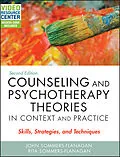Apply the major psychotherapy theories into practice with this comprehensive text Counseling and Psychotherapy Theories in Context and Practice: Skills, Strategies, and Techniques, 2nd Edition is an in-depth guide that provides useful learning aids, instructions for ongoing assessment, and valuable case studies. More than just a reference, this approachable resource highlights practical applications of theoretical concepts, covering both theory and technique with one text. Easy to read and with engaging information that has been recently revised to align with the latest in industry best practices, this book is the perfect resource for graduate level counseling theory courses in counselor education, marriage and family therapy, counseling psychology, and clinical psychology. Included with each copy of the text is an access code to the online Video Resource Center (VRC). The VRC features eleven videos each one covering a different therapeutic approach using real therapists and clients, not actors. These videos provide a perfect complement to the book by showing what the different theories look like in practice. The Second Edition features: New chapters on Family Systems Theory and Therapy as well as Gestalt Theory and Therapy Extended case examples in each of the twelve Theory chapters A treatment planning section that illustrates how specific theories can be used in problem formulation, specific interventions, and potential outcomes assessment Deeper and more continuous examination of gender and cultural issues An evidence-based status section in each Theory chapter focusing on what we know from the scientific research, with the goal of developing critical thinking skills A new section on Outcome Measures that provides ideas on how client outcomes can be tracked using practice-based evidence Showcasing the latest research, theory, and evidence-based practice in an engaging and relatable style, Counseling and Psychotherapy Theories in Context and Practice is an illuminating text with outstanding practical value.
Autorentext
JOHN SOMMERS-FLANAGAN has a PhD in psychology and is Professor of Counselor Education at the University of Montana. He serves as a mental health consultant for Trapper Creek Job Corps. His research interests include clinical interviewing, parent consultations, and adolescent psychotherapy.
RITA SOMMERS-FLANAGAN is Professor of Counselor Education at the University of Montana. She provides mental health consultation at the Missoula Veterans Center and Trapper Creek Job Corps. She has taught and written in the area of applied, practical ethics for the past fifteen years.
John and Rita have coauthored seven books, including Clinical Interviewing, Fourth Edition; Becoming an Ethical Helping Professional: Cultural and Philosophical Foundations; and How to Listen so Parents Will Talk and Talk so Parents Will Listen (all published by Wiley).
Inhalt
Preface ix
About the Authors xvii
CHAPTER 1 Psychotherapy and Counseling Essentials: An Introduction 1
Background and Overview 1
Historical Context 3
Definitions of Counseling and Psychotherapy 6
What Is a Theory? 9
The Scientific Context of Counseling and Psychotherapy 10
Ethical Essentials 18
Emergence of Personal Theory 29
Our Biases 30
The Zeitgeist, the Ortgeist, and the Poltergeist 35
Concluding Comments 36
Chapter Summary 36
Introductory Key Terms 37
Recommended Readings and Resources 38
CHAPTER 2 Psychoanalytic Approaches 41
Biographical Information: Sigmund Freud 41
Historical Context 42
Psychoanalytic Theoretical Principles 44
Evolution and Development in Psychoanalytic Theory and Practice 49
The Practice of Psychoanalytic Therapy 58
Case Analysis and Treatment Planning 66
Evidence-Based Status 70
Concluding Comments 72
Chapter Summary 74
Psychoanalytic Key Terms 75
Recommended Readings and Resources 76
CHAPTER 3 Individual Psychology and Adlerian Therapy 79
Biographical Information: Alfred Adler 80
Historical Context 80
Theoretical Principles 82
The Practice of Adlerian Therapy 93
Case Analysis and Treatment Planning 109
Cultural and Gender Considerations 112
Evidence-Based Status 112
Concluding Comments 115
Chapter Summary 115
Individual Psychology Key Terms 116
Recommended Readings and Resources 117
CHAPTER 4 Existential Theory and Therapy 119
Key Figures and Historical Context 120
Theoretical Principles 125
The Practice of Existential Therapy 134
Case Analysis and Treatment Planning 141
Cultural and Gender Considerations 145
Evidence-Based Status 146
Concluding Comments 148
Chapter Summary 148
Existential Key Terms 149
Recommended Readings and Resources 150
CHAPTER 5 Person-Centered Theory and Therapy 153
Biographical Information: Carl Rogers 154
Historical Context 154
Theoretical Principles 157
The Practice of PCT: AWay of Being With Clients 163
Case Analysis and Treatment Planning 177
Cultural and Gender Considerations 181
Evidence-Based Status 182
Concluding Comments 185
Chapter Summary 185
Person-Centered Key Terms 186
Recommended Readings and Resources 187
CHAPTER 6 Gestalt Theory and Therapy 189
Biographical Information: Fritz Perls and Laura Posner Perls 190
Historical Context 191
Theoretical Principles 194
The Practice of Gestalt Therapy 200
Case Analysis and Treatment Planning 215
Cultural and Gender Considerations 218
Evidence-Based Status 219
Concluding Comments 220
Chapter Summary 220
Gestalt Therapy Key Terms 221
Recommended Readings and Resources 222
CHAPTER 7 Behavioral Theory and Therapy 225
Key Figures and Historical Context 226
Theoretical Principles 229
The Practice of Behavior Therapy 233
Case Analysis and Treatment Planning 251
Cultural and Gender Considerations 256
Evidence-Based Status 257
Concluding Comments 258
Chapter Summary 259
Behavior Therapy Key Terms 259
Recommended Readings and Resources 260
CHAPTER 8 Cognitive-Behavioral Theory and Therapy 263
Historical Context and Biographical Information 264
Theoretical Principles 270
The Practice of Cognitive-Behavioral Therapy 275
Case Analysis and Treatment Planning 288
Cultural and Gender Considerations 293
Evidence-Based Status 294
Concluding Comments 296
Chapter Summary 296
Cognitive-Behavioral Therapy Key Terms 297
Recommended Readings and Resources 298
CHAPTER 9 Choice Theory and Reality Therapy 301
Biographical Information: William Glasser 301
Historical Context 302
Theoretical Principles 303
The Practice of Reality Therapy 313
Case Analysis and Treatment Planning 321
Cultural and Gender Considerations 326
Evidence-Based Status 328
Concluding Comments 330
Chapter Summary 330
Choice Theory/Reality Therapy Key Terms 331
Recommended Readings and Resources 331
CHAPTER 10 Feminist Theory and Therapy 333
With Maryl J. Baldridge
Historical Context 334
Theoretical Principles 340
The Practice of Feminist Therapy 347
Case Analysis and Treatment Planning 358
Cultural and Gender Considerations 362
Evidence-Based Status 363
Concluding Comments 363
Chapter Summary 364
Feminist Key Terms 365
Recommended Readings and Resources ...
